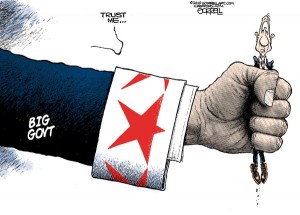by Carly Fiorina • USAToday
 We knew hack of security clearance records was coming, but we did too little to stop it.
We knew hack of security clearance records was coming, but we did too little to stop it.
Last week, we learned that that 1 in 15 Americans was personally affected by the federal Office of Personnel Management’s egregious failure to protect our most personal information. It is now clear that their security breach compromised the personal information of every U.S. citizen who has undergone a government background check in the last 15 years. That is nearly 22 million people — more than the population of the state of New York and nearly 7% of the entire U.S. population.
Social Security numbers, health information, fingerprint records and information about family or foreign contacts were compromised. This breach violated not only our right to privacy – but also the very safety and security of our nation.
This is beyond unacceptable. Our society cannot thrive if we cannot protect the most personal information of our citizens. And, unfortunately, this raises very real questions about what other sensitive information is at risk — or has already been compromised.
These are the core functions of government: to provide for the common defense and to protect the liberty of its citizens. Right now, our government is not fulfilling these core duties and the American people are rightfully losing faith.
Sadly, a hack of this size and scope was not unexpected — and it was absolutely preventable. During my time advising the CIA and several secretaries of defense, I and many of my colleagues recognized that our cybersecurity infrastructure and protocols were woefully inadequate. We have known without a doubt for at least 12 years that the Chinese were trying to hack into our federal government databases and systems.
It was clear then, as it is now, that we lacked even the most basic protections for highly sensitive data. Having led the world’s largest technology company, I understand cybersecurity protocols. And I know that things that have been considered standard industry practice for years, such as two factor authentication, were not fully implemented. This was true even as we became increasingly aware of the threat posed by the Chinese. It’s no surprise that they were able to hack into our systems — we have long known that they had this capability.
We knew these things and yet we did nothing. Decades of warnings and suggested countermeasures were ignored. Inspector General recommendations were ignored.
As usual, Congress dragged its feet and civil servants refused to step up to the plate. Now, when the worst has happened, they’re finally prepared to take action.
And what will this “action” entail? Congressional leaders will give indignant speeches, more heads will roll and we’ll have little to show for it. We saw this same thing at the Veterans Administration. When their scandalous ineptitude was made public, they shouted about the need for reform, but we haven’t seen real change. Our veterans remain underserved, but the political class has moved on.
Even worse, this type of ineptitude is not unique to the OPM. We see it throughout the government. It is simply another example of the ineptitude of a giant government bureaucracy that has grown too big for its own good.
As president, I would work with all of our national security leaders to establish a consolidated command that is empowered to protect the security of all government systems and databases. I would ensure that we have exceedingly competent people with the right set of skills — not just people who have been in government for a long time. I will make sure that we are partnering with private sector leaders to identify and address these threats.
I will also put an end to the bloated, corrupt bureaucracy that enabled this crisis in the first place. I will work to reform the civil service, developing and encouraging a culture of meritocracy. I will make sure our government is a small, flexible force for positive change — instead of a vast system dedicated to protecting the status quo.
It is clear that we need a fundamental reimagining of government. That starts with citizenship and leadership. It starts with a definitive message to the professional political class: we will not stand for this anymore.
Carly Fiorina, a Republican candidate for president, is the former CEO of Hewlett-Packard.